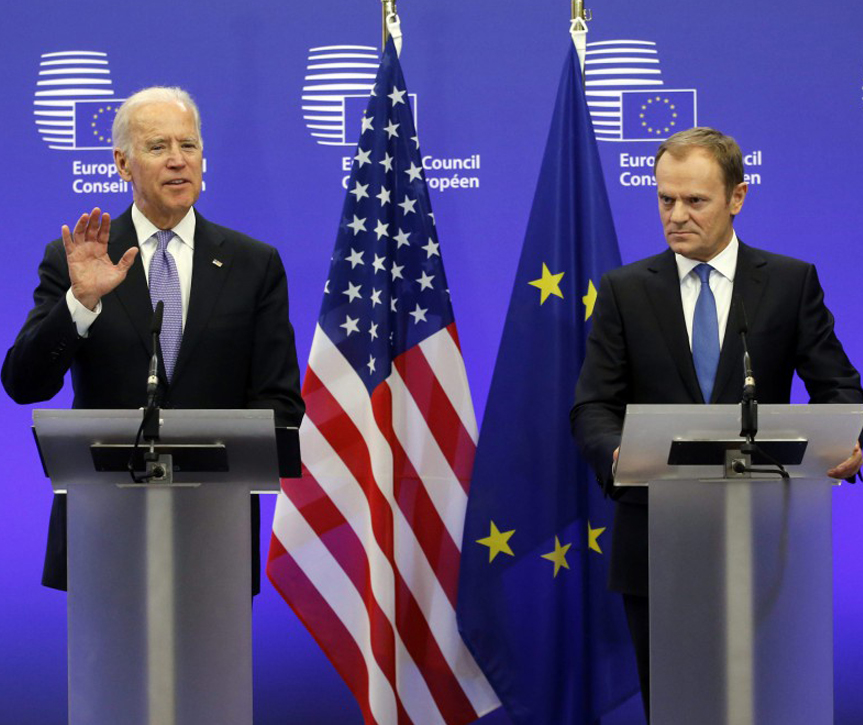During his campaign, and later when he became the elected president, Biden kept focusing on promises of bringing the United States back to the leadership of the world, he promised to rehabilitate alliances around the world, through the Middle East, Latin America, Asia and Europe in particular.
For many, Biden is not just an expert in foreign policy who is coming to the white house, he has, as well, a classic vision of the international order in post WWII phase, that is generally based on international institutions and liberal values. Such perspective brings peace of mind to many leaders who suffered lately an inability to predict the United States foreign policy. This problem forced some observers to point out the fact of the retreat of this country from the position of leading the world, and withdrawal from world stage under the banner of Trump`s policy “America`s First”.
The content of this article will not be about the past four years, as they were filled with anxiety and confusion regarding the future of the American alliances and how far it affects international institutions and organizations such as the United Nations, World Health Organization, North Atlantic Alliance (NATO) and others. Rather, it will tackle the main dimensions of the next four years. Although Biden`s ambitions to reform the American path are very clear, that does not make the huge amount of internal and external challenges just disappear, not only in the course of alliances and relationships, but on the level of international order as a whole.
Europe might be divided over Biden
While the entire world is expecting a lot of Biden, the joy and congratulations after announcing his victory may not reflect all the views and perceptions going on in closed halls, but that does not apply to some parts of Europe and its counterparts of democratic liberal systems. Many European leaders felt great relief after the victory that Biden achieved, mainly because he is a president trained in dialogue and diplomacy in Atlantic constants. Those leaders look forward to restoring the relationships that were severely affected during Trump`s administration, they also welcome Biden`s discourse that calls for the importance of plurality and having alliances, and realizes the necessity of accords such as Paris Climate Agreement and Iran's Nuclear Agreement. It is reasonable to wonder, anyway, is Europe still the needed partner for the United States?
No doubt that Europe as a whole agrees on the necessity for the United States to stay strong as it is the insurer and the protector of the international order established by the west, and that`s why Europe sees Biden`s victory as a beginning for recovery and regaining what was lost during the past few years, but by any means, Europe is not the same as it was before.
Then again, Biden may change his discourse towards Europe, but his policy in general will not witness a radical change. Trump`s “rude” demands will always stay present, as there is consensus in the United States regarding the need to increase the contributions Europe providing for the “NATO”, as well as Biden`s position on the commercial war between Boeing and Airbus that is not going to change, not to mention that he shares Trump`s fears of the Chinese technology companies accessing Europe, and finally, the matter of the pipe line project “Nord Stream 2” running from Russia to Germany.
Nevertheless, Europe realizes that Biden`s victory does not mean neglecting the record number of votes Trump achieved, proving that “America`s First” method will remain dominant in Washington for many years to come, and that the recovery Europe needs for the American force must start internally through reviving economy, creating jobs and reducing political polarization, all which may not be achieved without continuing to follow a foreign policy that is less participatory, in addition to building a more restrained financial system.
On the other hand, the effects of having a Centre-Left American president -who is pressured by a broadly based constituency of progressive left - are not clear when we take into consideration the excessive growth of rightist parties that were inspired by Trump, not to mention that representatives of such parties rule in large European countries like Britain and Italy, and even the leftist leaders started to implore these groups for electoral purposes. In this context, Biden did not hide his resentment of the right when he described the British Prime Minister as a “a physical and emotional clone of Trump”.
There is yet another changing aspect for the relationships across the Atlantic, represented in what we can call the European “renaissance” of economic and strategic interests. European countries may oppose the return of the United States to be the strong face of the Atlantic, and that is indeed an old/new European ambition as Europe is a significant force in the international scene, Not to mention the calls leaded by France in particular to reach a more independent and effective Europe, an endeavor that was being nourished by Trump`s method “America`s First”. So, regardless of the changes in discourse as a result of Biden`s win, still, the cross-Atlantic relations may never go back to the way they were.
The world is done with liberal values
Many analytics tend to think that Biden must reorganize the regional scene in the Middle East and East Asia each according to its own context.
In other words, for the Middle East, reestablishing the nuclear agreement with Iran, a policy that shaped the region`s facet right before Obama`s administration, and reshaped it later after Trump`s withdrawal from this agreement, which is, in fact, not just some international understanding about the Iranian nuclear issue, it is rather a tool used to manage the balance of powers and its preferences in the Middle East.
While in East Asia, Biden`s policy might be more pronounced, he leans towards plurality and creating alliances, which means facing the Chinese growth by activating operational multilateral mechanism, he might also seek to contain China by improving collaboration with allies such as: Japan, Australia, South Korea and India.
As Biden stresses the importance of forming alliances and plurality for the United States in order to gain back its previous role, many world leaders will want to know what are the exact requirements suitable for Biden`s administration to gain the title of an ally?
Biden`s public speech shows clearly his tendencies towards traditional origins of American values, based on democracy and promoting human rights, all of this highlights an issue that is probably anticipated by many world leaders, friends and foes, that is, Biden`s commitment to reinstalling democracy in the center of the United States foreign policies, as he already promised to hold a summit for democratic countries after being assigned as president, to unite these countries in a frontier to face the escalating tyranny across the world.
And as for the Middle East, it is expected to witness a resurgence of tension between leaders of this region at one end, and Biden at the other. Many regard the western discourse to be the cause of the disturbances witnessed that occured and still going on in the region, namely after the events of what was known as the “Arab Spring”. And even before these events, there were the American plans to change the scene in the Middle East that lead to the intervention of the United States in Iraq in 2003, changing the balance of powers in it.
While it is very likely for Biden to keep on following Trump`s policies of partial withdrawal and avoiding direct interference in the conflicts and disputes in the region - mainly because the American public are sick of the repeated interventions in Afghanistan and Iraq, and even the limited presence in Syria - his approaches might be directed towards calls related to human rights and democracy.
At the same time, when many foresee that the United States relations with many of its partners in the middle east will worsen as a consequence of this discourse, it is also expected at the same time to have some winners. These countries might be shedding the burden of pressures that Trump used to practice over it to stop and limit its dealings with competitive countries such as China and Russia – countries that they already deal with because of the privileges of a partnerships free of demands.
And so, it is very likely of such countries to head more towards the east and away from the west.
In any scenario, this discourse will not only affect allies, but competitor countries as well, like China and Russia.
During Trump`s administration, the Chinese-American competition manifested at best in what was known as “Trade war” which is expected to continue during Biden`s administration, but the added pressure will be concentrating on the matter of human rights in a stricter manner than it used to be during Trump`s administration that gave little attention to the subject.
This strategy was promoted by Biden prior to his campaign, not to mention his description of the Chinese president as a “Butcher” in comment to his policies towards the Uyghurs Muslim minority, besides a similar opinion regarding the Hong Kong file that is highly sensitive issue for the Chinese.
The current approach based on democracy and human rights, might create some serious concern for the Chinese leadership, as the trade war was intercepted by negotiations added to the ability to practice deterrence - granted having the needed tools and the economic force - but forming a democratic front to face China will reduce its chances in accessing the international order, simply because participating in this order will be associated with abidance to its rules.
The situation will not be very different for Russia, given that Biden described it in his last speech as a vice president in 2017 to be “the biggest threat to international order”, and now after he became a president, Moscow – that was always concerned about the democratic tide expressed in color revolutions and popular uprising starting in the nineties up to the Ukrainian revolution in 2014 and the protests in Belarus nowadays - is worried by his promises to go back to foreign policies based on democratic calls.
And here we should be observing the way Biden will be managing his policies in dealing with the ongoing protests in Moscow that increased noticeably in 2019, and his position of the accusations of harming Russian opposition, most recently poisoning Alexi Navalny who is a prominent figure in Russian opposition.
Conclusion
Europe is hopeful about Biden`s approaches towards cross Atlantic relations, but everyone realizes the challenges facing such relations that are expected to be deepened further to face the rise of China and Russia ideologically speaking. Still, such relations may stumble upon many obstacles related to different files such as trade, Chinese technology and “Nord Stream 2” pipeline.
Meanwhile, the United States may not be in a position to maintain its substantial contributions to the “NATO” in order to push towards larger European contributions, and if the change in the context of rhetorical defense of liberal values and international order of post WWII resurfaces, then there will not be any progress in solving disputes or mending fractures.
Thus, Biden will not have much changes to consider as a new approach for the coming American foreign policy. Quite the contrary, he seeks to go back to the classical approach that made countries such as China and Russia criticize him and express discontent publicly.
Moreover, Washington will not have much to provide for the world, and Biden will be forced to clarify the mechanism by which world countries will comply to his directions, the opposite option will be watching allies moving away further to strengthen their relationships and dependence on China and Russia.
Keep in touch
In-depth analyses delivered weekly.










.jpg-%D9%87%D9%84-%D9%86%D8%B4%D9%87%D8%AF-%D8%A7%D8%AE%D8%AA%D8%B1%D8%A7%D9%82%D8%A7%D9%8B-%D9%81%D9%8A-%D8%B5%D9%88%D8%B1%D8%A9-%D8%A7%D9%94%D9%85%D8%B1%D9%8A%D9%83%D8%A7-%D9%84%D8%AF%D9%89-%D8%AD%D9%84%D9%81%D8%A7%D9%8A%D9%94%D9%87%D8%A7-%D9%81%D9%8A-%D8%A7%D9%84%D8%B4%D8%B1%D9%82-%D8%A7%D9%84%D8%A7%D9%94%D9%88%D8%B3%D8%B7.jpg)